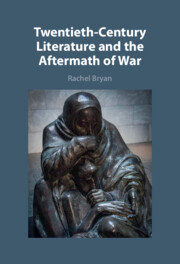Book contents
- Twentieth-Century Literature and the Aftermath of War
- Twentieth-Century Literature and the Aftermath of War
- Copyright page
- Dedication
- Epigraph
- Contents
- Acknowledgements
- Abbreviations
- Introduction
- Chapter 1 Untimely Deaths and Artful Promise in Henry James’s Post-1890 Writings
- Chapter 2 Reading Henry James in First World Wartime
- Chapter 3 Imaginary Widowhood in Elizabeth Bowen’s ‘A Year I Remember – 1918’ and A World of Love
- Chapter 4 Retroactive Judgements in Elizabeth Bowen’s The Heat of the Day
- Chapter 5 Traitors, Treason, and ‘Topsy-Turvy’ Values in Kazuo Ishiguro’s ‘The Summer After the War’ and An Artist of the Floating World
- Chapter 6 Art and Consolation in Kazuo Ishiguro’s Never Let Me Go
- Index
Chapter 2 - Reading Henry James in First World Wartime
Published online by Cambridge University Press: 20 December 2024
- Twentieth-Century Literature and the Aftermath of War
- Twentieth-Century Literature and the Aftermath of War
- Copyright page
- Dedication
- Epigraph
- Contents
- Acknowledgements
- Abbreviations
- Introduction
- Chapter 1 Untimely Deaths and Artful Promise in Henry James’s Post-1890 Writings
- Chapter 2 Reading Henry James in First World Wartime
- Chapter 3 Imaginary Widowhood in Elizabeth Bowen’s ‘A Year I Remember – 1918’ and A World of Love
- Chapter 4 Retroactive Judgements in Elizabeth Bowen’s The Heat of the Day
- Chapter 5 Traitors, Treason, and ‘Topsy-Turvy’ Values in Kazuo Ishiguro’s ‘The Summer After the War’ and An Artist of the Floating World
- Chapter 6 Art and Consolation in Kazuo Ishiguro’s Never Let Me Go
- Index
Summary
This chapter turns its attention to the first years of the Great War. Commencing with a reading of James’s wartime correspondence, its first half charts how the aging author was tormented, in the latter stages of 1914, by the possibility that his life and works might be subjected to retroactive disavowal in light of the conflict he never saw coming. It then discusses two of James’s wartime works, The Middle Years (1917) and The Sense of the Past (1917), focusing on how these texts engage with and reflect upon the prospect of undoing and recasting formative experiences. In its second half, the chapter zooms out slightly and offers a broader investigation of the wartime critical climate within which James’s acts of creative self-interrogation took place. Noting that as the conflict raged on, authors and critics alike became caught up in debates about the purpose of reading in wartime, the chapter draws on Rebecca West’s reviews of James from 1915 and 1916 and analyses her Jamesian novel, The Return of the Solider (1918), to explore the psychological and ethical pressures that were placed on another form of counterfactual consolation: the world into which we can escape through fiction.
Keywords
- Type
- Chapter
- Information
- Twentieth-Century Literature and the Aftermath of War , pp. 79 - 113Publisher: Cambridge University PressPrint publication year: 2025

